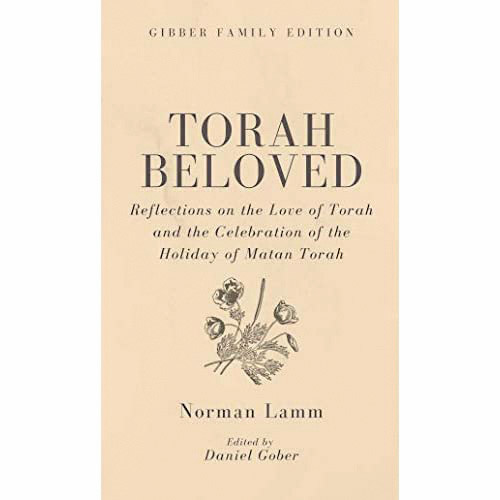
Reviewing: “Torah Beloved: Reflections on the Love of Torah and the Celebration of the Holiday of Matan Torah,” by Rabbi Dr. Norman Lamm. Gibber Family Edition. OU Press Ktav Publishing House. 2020.
Why review a collection of essays about Shavuot as we are intensely gearing up for the preceding chag of Pesach amidst trying and frightening times? Rabbi Dr. Norman Lamm provides an answer in one of his 24 erudite and articulate sermons and essays recently edited and compiled into one edition titled “Torah Beloved: Reflections on the Love of Torah and the Celebration of the Holiday of Matan Torah.” In answer to the famous query as to why Shavuot is referred to as z’man matan Toratenu, the time of the giving of our Torah, as distinct from z’man kabbalat Toratenu, the time of the receiving of our Torah, Rabbi Lamm elaborates upon the insight of a chasidic master who offered that while the Torah was given only once by God, its reception differs for each and every Jew. “Shavuot celebrates the gift, but it is up to each and every individual Jew to embrace it and receive it based upon our unique capabilities.” Thus, zman kabbalat Toratenu is marked every day of the year when we devote time to Torah study.
In editing this recent publication of January 2019, Daniel Grober admits to not having personally met Rabbi Dr. Lamm nor being present at one of his addresses. Yet he found himself coming back time and again to the Yeshiva University Lamm Heritage website to read more of the essays and sermons and to share them with others. Grober noted that a theme that Dr. Lamm returned to often was the love of Torah, and yet the sermons addressing this topic were not included in previous volumes of his works. Thus Grober took it upon himself to collect them in a volume that will enable every one of us to experience the breadth and depth of Torah as presented by Rabbi Lamm. “With the lessons and insights imparted to us by Rabbi Lamm in these sermons and essays, our love of Torah is sure to increase and we will be prepared to meet the challenge of the holiday of Shavuot which Rabbi Lamm so appropriately describes, ‘For every Jew must today, as an individual and in a sacred and inviolable personal act, receive the Torah.’”
Rabbi Dr. Norman Lamm was elected president of Yeshiva University in August of 1976, the third president of the University and the first native-born American to hold the position after Dr. Samuel Belkin and Dr. Bernard Revel. He served as chancellor of the university and rosh yeshiva of its affiliated Rabbi Isaac Elchanan Theological Seminary from 2003 until his retirement on June 30, 2013. Preceding his presidency of YU, Rabbi Dr. Lamm served on the YU faculty and eventually as the Erna and Jakob Michael Professor of Jewish Philosophy. During his 25 years as a pulpit rabbi, Lamm served as the spiritual leader of the Jewish Center in Manhattan where he had an extraordinary impact upon the Jewish community through his activism and eloquent scholarship.
Throughout this recent collection, Dr. Lamm addresses issues as current and relevant today as when they were first presented more than 50 years ago. In an essay dated May 18, 1964, titled “Strange Medicine,” Dr. Lamm cites a question by the famous Kotzker Rebbe, whose challenging insights are always relevant to every age. Why, asks the Kotzker, if the words of Torah are referred to as “for they are healing for your body and marrow for your bones” were three months to elapse from the time of yetzias mitzrayim to kabbalat haTorah, from the Exodus to the Receiving of the Torah? Why wasn’t this great dose of medicinal Torah dispensed immediately to the newly freed Jews? In answering, the Kotzker suggests that Torah is indeed a medicine but a strange one. It works only if the patient knows that he is sick and needs correction. The Children of Israel, upon exiting Egypt, were not even aware that they had absorbed the terrible impurities from the abysmal spiritual climate of Egypt, that they were baalei mumin, infected individuals. Hence they had to wait for the third month, the month of Sivan, when they realized their illness, for Torah to be effective as the medicine that would cure them.
In an essay titled “The Age of Gemini,” dated May 30, 1971, Dr. Lamm addresses the secularism of the Jewish state today and issues that require halachic responses within this climate such as the freeing of agunot, chained women. In presenting the argument for the halachic path, Lamm offers the significance of Shavuot being celebrated in the month of Sivan.
He points out that the Torah was not given in Nisan, for the zodiac sign of that month is the ram. Nor was the Torah given in the month of Iyar whose zodiac sign is Aries, the ox. The appropriate month for the receipt of the Torah is Gemini, the only month of the year whose sign reflects humans, as the zodiac sign for Sivan is twins, the Gemini. The inherent lesson being that the Torah was made for us, humans, who can respond to it with song and praise, devotion and enthusiasm. The sign of Sivan is twins, suggesting that each Jew has a “double” or “twin” relationship to the Covenant with Hashem, one as an individual who must choose and one as a member of the Jewish people who was chosen. We are each a Gemini: an independent individual and an integral part of the people of Israel.
Conveying the profundity of thought and the eloquence of Rabbi Dr. Norman Lamm is an insurmountable challenge. Only his original thoughts and words can be truly understood and appreciated. “Torah Beloved” is a welcome addition to the prolific Lamm library and heritage.
By Pearl Markovitz













